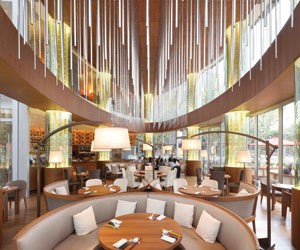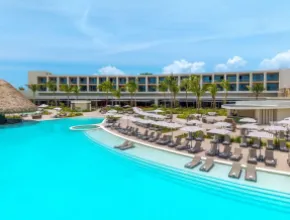International incentives are back. That’s the word from incentive planners, destinations, hotels and the destination management companies that tie them all together.
In New Jersey, independent meeting planner Gloria Hobbins saw her incentive business wither during the recession. Today, she is riding a new wave of interest in incentives outside North America.
“Companies are back with smaller, more targeted programs,” she says. “As incentive sponsors see their own business improve, they are rediscovering the benefits of incentivizing and rewarding their top performers.”
Larger organizations are riding the same wave.
BCD Meetings & Incentives is planning and operating more than 600 incentive programs worldwide this year, according to Minneapolis-based Mary MacGregor, the firm’s vice president of business development. More than half of its programs are headed outside the confines of North America.
Where are programs going? Anywhere that time and attendees’ love of adventure and motivation will allow. BCD Travel is working incentives on every continent.
London-based Andrew Ashmore, Hyatt Hotels & Resorts’ vice president of global sales–Europe, Asia, Middle East, says Istanbul is hot. So are Berlin, Moscow, Amman, Dubai, Abu Dhabi, Shanghai, Macau, Hong Kong and Johannesburg, among other favorites.
Korea is also a booming incentive destination.
“Travel follows trade,” says Jane Schuldt, CITE, president of Minneapolis-based World Marketing Group. “So it’s no surprise that we’re seeing more and more inquiries for Korea. Korea even made it to the Academy Awards as an actor’s publicity stunt.”
Where will incentive participants want to head next? Keep an eye on culture and politics. Expect demand for Turkey and China to build as the new James Bond film Skyfall approaches release in November. Istanbul and Shanghai are bracing for an explosion of interest as filmgoers see Daniel Craig take down a new set of bad guys in both of these destinations.
Suppliers have already started building. Hyatt has four properties in Shanghai, Ashmore says, and is discussing another two or three hotels.
Today’s political flash points are tomorrow’s hot incentive destinations. Few planners would have tagged Moscow as an attractive destination during the economic chaos of 1992, but today it is one of the most popular incentive venues in Europe, despite a spot among the five most expensive cities in the world.
“There will be incentive programs in Iran,” Schuldt predicts. “Burma is opening up. Walls are coming down around the world. The situation is always changing.”
The World is Your Oyster
International programs can be fabulous motivational tools, MacGregor says, but points out that having international elements also adds layers of complexity. International travel requires more documentation, more investigation, more planning, more attention, more preparation, more follow up and more time than the typical domestic program. A local destination management company, or DMC, is the single most important choice a planner can make when launching an international incentive program.
“There is not a U.S.-based planner who can immerse themselves in all the details of a destination like that local expert,” B.C.D.’s MacGregor says. “Unless you have an extraordinarily strong presence on the ground, say a global or regional headquarters staff in your destination city, you can’t afford not to use a DMC.”
Schuldt explains that U.S. planners have gotten very adept at handling arrangements for domestic programs. DMCs play a less important role for domestic meetings because it is so easy to pick up a phone and talk to any supplier, nationwide, any time.
“That doesn’t happen in the international supply chain,” Schuldt says. “You will hit a wall of time zone or language or business customs at some point, and likely very early on. You need someone on your side who knows the language, culture, customs and ways of doing business locally.”
That’s not to say that a DMC comes without costs. As recently as 2007 or 2008, DMCs had a reputation for fat markups in the 30 percent range. Multiple financial crises and recessions later, industry sources say the markup has been reduced by half and sometimes more.
“In these tough economic times, everyone has sharpened their pencils,” says Nigel Bramich, vice president of WOW–America, a Los Angeles-based company that represents DMCs worldwide. “The actual cost varies wildly.”
Some clients opt for net rates and a fixed management fee,” he continues. “Some take offsets against commissions. Some share commissions and costs. It’s about the arrangement that is most appropriate for this client in this destination at this time. Your next program might be structured entirely differently because the destination or demand or some other factor is different. The important point for planners to remember is the whole world wants your business. When it comes to incentives, the world is your oyster.”
Not Too Long, Not Too Short
But any oyster lover will admit that it takes time, patience and special skills to shuck an oyster. The same applies to international incentives.
International programs tend to run longer than domestic programs, Bramich says. The reason? International flights are usually longer than domestic flights. Programs in London might be as short as four nights, but only if participants can use a night arrival flight to gain extra time on the ground. Five to seven nights is more realistic given the length of transcontinental flights.
The same five- to seven-night minimum works for Asia and South Africa, but longer is better. Every additional night on the ground adds excitement and motivational value to the program.
Documentation is a key international issue. Every participant must have a passport valid for international travel, Schuldt advises—no exceptions, period. Most countries, the U.S. included, require that passports be valid for at least six months beyond the final date of travel and contain empty pages for visas and stamps.
Documentation gets even more complex if the program has participants from multiple countries. Passport and visa requirements can vary by country of citizenship and/or residence. A U.S. passport holder may need a visa for a specific country while a Canadian passport holder might not, or vice versa. Visa requirements may be different for participants from Great Britain versus Russia, and different again for someone holding a Nigerian or Brazilian passport.
“You can’t emphasize the need for a valid passport and visa too strongly or too often,” Schuldt stresses. “Your air carrier won’t board your participants if they don’t have the correct documentation. If the carrier boards them, the destination country won’t allow them to enter. It is your responsibility as the planner to ensure that everyone has the proper travel documents.”
Hotel branding is another potential complication. Sheraton may not be positioned as a top luxury brand in domestic destinations, MacGregor notes, but in parts of Europe, Sheraton is the pinnacle to beat. In Southeast Asia, Best Western can provide levels of service and luxury undreamt of in North America. Brands such as Taj, Barcelo or Radisson Blu may be all but unknown domestically yet provide breathtaking international experiences.
“It is all too easy to end up with the U.S. perception of particular brands coloring your reality,” Schuldt says. “You need to be open-minded about looking at brands you’ve never heard of or might not consider here. And don’t forget to communicate that difference to your participants. Conveying the excitement of a new-to-them brand makes all the difference to their ultimate experience and the value of the program to your client.”
The Takeaways
- Programs are smaller, more targeted
- What’s hot: Istanbul, Berlin, Moscow, Amman, Dubai, Abu Dhabi, Shanghai, Macau, Hong Kong, Johannesburg, South Korea
- Use a DMC, but closely examine fee structure
- Emphasize info about passports and visas to delegates strongly and often
- Specific hotel brands may differ internationally
Veteran travel industry reporter Fred Gebhart has never won an incentive but does enjoy international travel.






